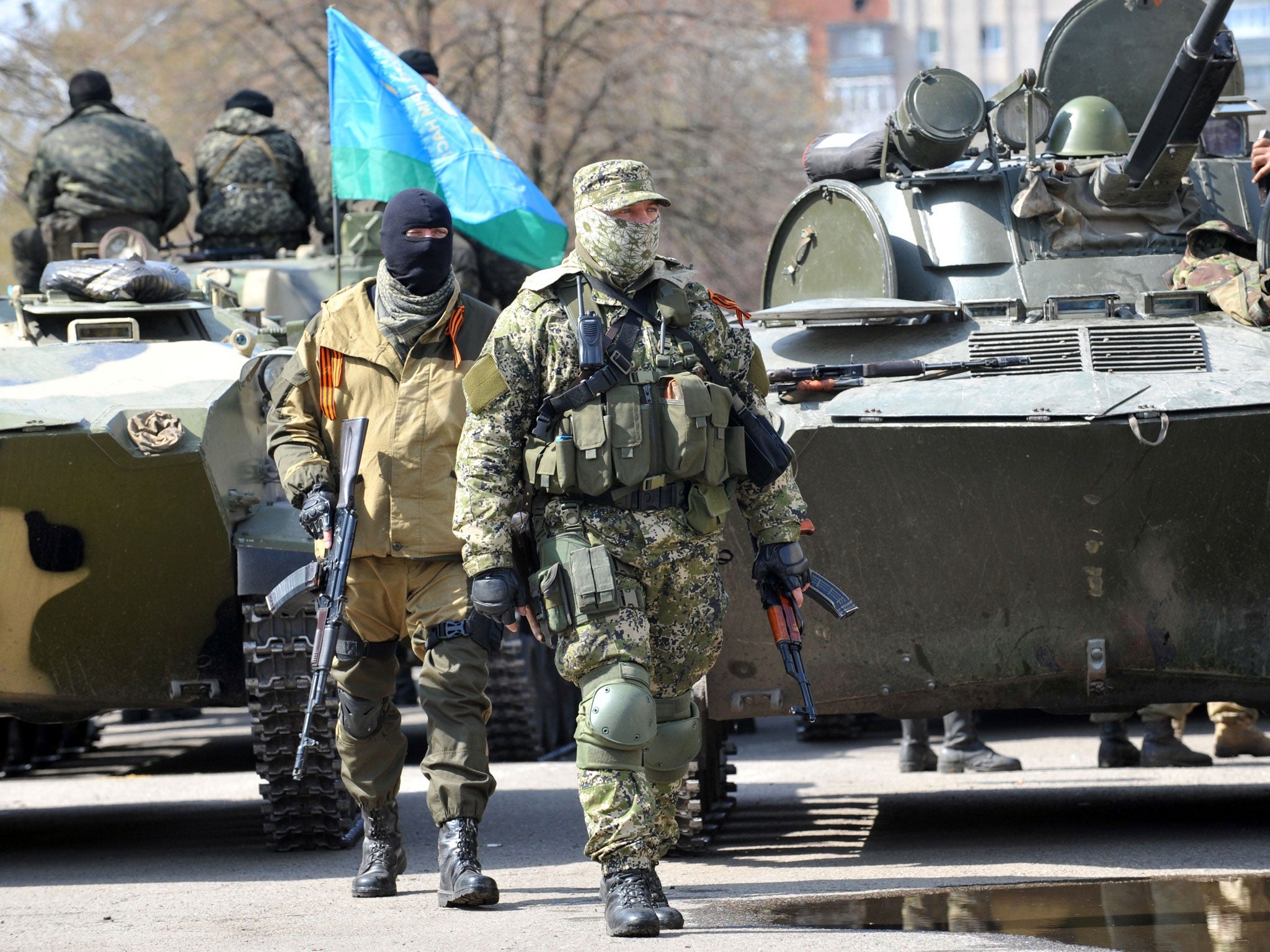Ukraine crisis: Slavyansk shooting threatens fraught Easter truce
Moscow and Kiev trade accusations over the identity of the attackers

Your support helps us to tell the story
From reproductive rights to climate change to Big Tech, The Independent is on the ground when the story is developing. Whether it's investigating the financials of Elon Musk's pro-Trump PAC or producing our latest documentary, 'The A Word', which shines a light on the American women fighting for reproductive rights, we know how important it is to parse out the facts from the messaging.
At such a critical moment in US history, we need reporters on the ground. Your donation allows us to keep sending journalists to speak to both sides of the story.
The Independent is trusted by Americans across the entire political spectrum. And unlike many other quality news outlets, we choose not to lock Americans out of our reporting and analysis with paywalls. We believe quality journalism should be available to everyone, paid for by those who can afford it.
Your support makes all the difference.Russia and Ukraine have descended into a bitter blame game after a gunfire battle killed at least one person and left three wounded in the eastern Ukraine town of Slavyansk on Sunday.
The incident comes just hours after Kiev declared a truce coinciding with the Easter holidays in an effort to de-escalate tensions in the volatile region where pro-Russian groups have seized government buildings calling for the interim government to resign.
The identity of the attackers remains unclear with both sides trading accusations and blaming each other for the deadly clash.
In a statement, Russia's foreign ministry blamed Ukraine's Right Sector, a far-right paramilitary group which played a prominent role in the ousting of former president Viktor Yanukovych.
"Russia is indignant about this provocation by gunmen, which testifies to the lack of will on the part of the Kiev authorities to rein in and disarm nationalists and extremists," the statement said.
The Right Sector denied being involved in the Slavyansk shooting and blamed Russian special forces for the attack.
"It is a blasphemous provocation from Russia, blasphemous because it took place on a holy night for Christians, on Easter night. This was clearly carried out by Russian special forces," Artem Skoropadsky, a spokesman for the Right Sector, told Reuters.
Ukraine's intelligence service also accused Russia of staging the shooting and "terrorising the local population" as part of a "cynical provocation" "supported and armed by officers of Russia's GRU" military intelligence.
The country's interior ministry said one person was killed in the attack and three were wounded. It said none of its forces had mounted an operation overnight in the area, which it described as "the most dangerous place in Ukraine, in view of the presence in the town of foreign saboteurs and illegal armed groups".
It also raised suspicion about the speed in which "camera crews from Russian TV stations appeared at the scene of the shooting, and the obviously staged subject matter of news reports in the Russian media".
Pro-Russian separatists said the battle broke out at around 2am after four vehicles approached their checkpoint and opened fire.
Kiev fears Russian forces could enter the country and seize more Ukrainian territory under the pretext of maintaining peace in the region.
Meanwhile, Ukraine's interim Prime Minister Arseniy Yatsenyuk lashed out at the Kremlin accusing President Vladimir Putin of trying to "restore the Soviet Union" in an interview with NBC's Meet the Press on Sunday.
"President Putin has a dream to restore the Soviet Union," said Yatsenyuk. "And every day, he goes further and further. And God knows where is the final destination."
The Russian leader famously described the collapse of the USSR in 1991 as the "greatest geopolitical catastrophe" of the 20th century.
Today, Mr Yatsenyuk warned that restoring the Soviet Union would be the "biggest disaster of this century".
His comments come after a senior mediator with the Organisation for Security and Cooperation in Europe (OSCE) set off for eastern Ukraine to try to persuade pro-Russian groups to lay down their arms on Saturday.
Separatists have remained in the buildings in defiance to an agreement reached between the interim government in Ukraine, Russia, the United States and the European Union.
Washington has threatened further sanctions on Russia if it does not work to use its perceived influence over the separatists to get them to leave the buildings.
Join our commenting forum
Join thought-provoking conversations, follow other Independent readers and see their replies
Comments